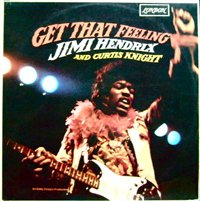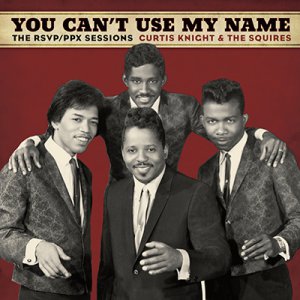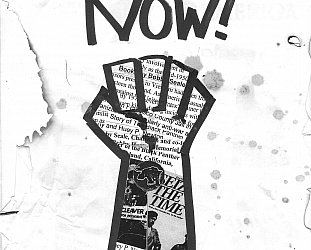Graham Reid | | 2 min read

In the year before he left for London and subsequent wild acclaim in late '66, JImi Hendrix was gigging around New York and during that time hooked up with soul singer Curtis Knight and his band the Squires with whom he'd sometimes play.
Knight introduced Jimmy (as he was then) to record producer/entrepreneur Ed Chalpin and JImi, Knight and the Squires did some sessions for Chalpin's PPX company.
And Hendrix -- believing he was simply signing a release to get paid for the sessions -- put his name to a contract which, it turned out, paid him $1 and one percent of royalties.
That one percent of sales of the two singles the RSVP label released in '65 -- How Would You Feel b/w Welcome Home and Hornet’s Nest b/w Knock Yourself Out -- would amount to absolutely nothing even if they had sold.
The latter two were instrumentals written by Hendrix, the first ever commercial release of his own music.
Neither single did well and by the time Hendrix went off to Britain Chalpin had lost interest in him and Knight.
However once Hendrix soared in the UK and Chalpin read about it in Billboard he brushed off that contract again because there was another key clause: Hendrix was signed to him for three years, until October '68.
Lawyers got involved and Chalpin got busy, the first thing he did was release the album Get That Feeling which pulled together 10 tracks (including Hornets Nest and Knock Yourself Out, both credited to Knight in his haste to get it on the market).
It came in a dishonest cover -- a photo of Hendrix in full flight at the Monterey festival -- and shortly after Chalpin released another album, Flashing, drawing from these pre-fame sessions. Hendrix's fan base was bewildered and throughout his life Hendrix and lawyers battled for possession of the masters and rights.
That was all finally resolved in . . . 2003, decades after Hendrix's death and now the family own the recordings.
 And have just released a cleaned-up version of them under the title You Can't Use My Name (which you hear Hendrix saying seriously in some studio banter, because peculiarly he went back and recorded for Chalpin again and some of those pieces appear on the album).
And have just released a cleaned-up version of them under the title You Can't Use My Name (which you hear Hendrix saying seriously in some studio banter, because peculiarly he went back and recorded for Chalpin again and some of those pieces appear on the album).
It is mostly juvenilia or casually thrown off material and rarely reaches the heights of Hendrix just a year or so later, but the album isn't without interest.
The first track is the socio-political statement by Knight of How Would You Feel (based firmly on Dylan's Like a Rolling Stone) and in the instrumentals -- as with the early Isley Brothers tracks featuring Hendrix on the box set West Coast Seattle Boy -- the genius is all there waiting to explode.
There is blues (Don't Accuse Me), pop (Gotta Have a New Dress), standard party r'n'b (Welcome Home, Simon Says) and moody soulful pieces (Fool For You Baby) but of course Knight is the man up front and Hendrix just flickers in from time to time (Strange Things).
Interestingly it doesn't contain Hush Now with Jimi on wah-wah and Knight - his vocal dubbed in later after Hendrix had found fame -- doing a pretty decent Hendrix vocal impersonation. That is here if you are curious.
The album is availble on CD, vinyl and iTunes (where you can't buy individual tracks, which is probably smart) but if you want to check it out is is also on Spotify here.
The track I have posted though is lifted from my scratchy old original vinyl copy of Get That Feeling. Because I like it that way, and I was such a fan I was fooled by it back then . . . until I played it a couple of times.
There is a swag of Jimi Hendrix at Elsewhere starting here.
For more one-off, oddities or songs with an interesting backstory see From the Vaults.





post a comment